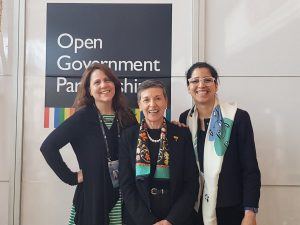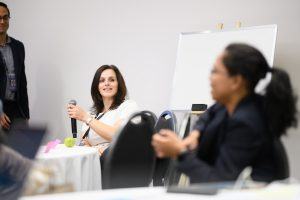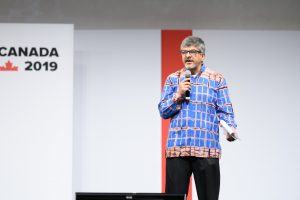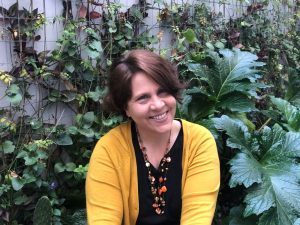Faces of Open Government: Ines Pousadela
Rostros del gobierno abierto: Inés Pousadela
Ines Pousadela is a researcher for OGP’s Independent Reporting Mechanism (IRM)The Independent Reporting Mechanism (IRM) is OGP’s accountability arm and the main means of tracking progress in participating countries. The IRM provides independent, evidence-based, and objective ... and is a Senior Research Specialist at CIVICUS. As an IRM researcher, she has assessed commitments in Chile, Argentina, and other countries. She sat down with OGP ahead of IRM Week to discuss the importance of ambitious commitments, protecting civic space, and the future of OGP.
From your perspective as a researcher and having worked with the IRM for more than half a decade, how do you think open government has evolved over the years? And what has been the role of the IRM in that process?
In the years that I have been working on the issue, I have seen the concept of open government evolve before my eyes, and I must say that I have learned alongside stakeholders in government as well as civil society.
In the beginning, there was a great fascination with technology. Many early commitments focused on incorporating digital technology into governance and were not always relevant to the OGP framework, because technological innovation was often not put at the service of any of the principles of open government. For example, some commitments promoted initiatives such as the introduction of digital signatures in public administration, which might speed up bureaucratic processes but would have no effect whatsoever on the openness of government. I think that at the beginning, the confusion of open government with e-government was commonplace, and that led to many commitments that were easy to fulfill but quite inconsequential.
Second-generation action plans tended to be more ambitious, co-creation processes were refined and an open government community started to form. Within that community, a common understanding of the principles of access to information and public participationGiving citizens opportunities to provide input into government decision-making leads to more effective governance, improved public service delivery, and more equitable outcomes. Technical specificatio... soon emerged. But many people continued to struggle with the less-straightforward concept of public accountabilityAccording to OGP’s Articles of Governance, public accountability occurs when ”rules, regulations, and mechanisms in place call upon government actors to justify their actions, act upon criticisms ... More. While this still persists, I think we are currently reaching a new stage as we shift from the concept of open government to the concept of an open state, moving both sideways through the state structure to incorporate other stakeholders beyond the Executive branch of government, and down the territorial structure of the state to incorporate lower levels of government, such as provinces or states and municipalities.
I believe a lot of work remains to be done, particularly on the ambitionAccording to OGP’s Articles of Governance, OGP commitments should “stretch government practice beyond its current baseline with respect to key areas of open government.” Ambition captures the po... and impact of OGP commitments, but I am truly amazed at the amount of progress that has happened in such a short time.
Protecting and enhancing civic space is a big priority for OGP and its Steering CommitteeThe Steering Committee is OGP’s executive decision-making body. Its role is to develop, promote and safeguard OGP’s values, principles and interests; establish OGP’s core ideas, policies, and ru... Co-ChairsThe leadership of the Steering Committee is made up of four co-chairs who provide strategic guidance and support to advance OGP’s overarching priorities. Co-Chairs serve two-year terms beginning on ..., yet the IRM has found that only 14% of OGP commitments on this policy area achieve strong results. What can OGP members do – at the local and national level – to improve these commitments and create a stronger and healthier space for journalists, activists, and engaged citizens to safely voice their needs and concerns?
Relatively open civic space conditions – in which people’s fundamental freedoms to organize, speak up and protest are respected – should be the most conducive to a meaningful OGP co-creation processCollaboration between government, civil society and other stakeholders (e.g., citizens, academics, private sector) is at the heart of the OGP process. Participating governments must ensure that a dive.... You would expect that governments interested in opening up to their citizens and therefore deciding to become OGP members would uphold a quite healthy civic space, but that is not really the case. While it is true that, overall, OGP countries fare much better than non-OGP countries regarding their civic space conditions, there are several OGP members whose civic space is either obstructed or repressed. In many places, we see serious and quite systematic abuses such as attacks on human rightsAn essential part of open government includes protecting the sacred freedoms and rights of all citizens, including the most vulnerable groups, and holding those who violate human rights accountable. T... defenders and journalists, the repression of protests and arbitrary restrictions on the work of progressive, rights-oriented civil society organizations. It is quite hard to imagine civil society in those contexts engaging in meaningful co-creation processes.
But OGP processes, particularly in countries experiencing significant civic space restrictions, may also offer an opportunity to strengthen the freedoms of association, expression and peaceful assembly. So why aren’t there more commitments around civic space, and what can we do to encourage the co-creation of such commitments? I think we should work more closely with civil society to identify the specific civic space challenges in their contexts, find open government solutions to them, and translate those into ambitious OGP commitments. We should then support their advocacy efforts to have those commitments adopted into their national action plans. And, if we want to see actual results, we need to continue supporting them so they can monitor their implementation or, better still, so they can play a role in co-implementing them.

Ines Pousadela at the OGP Global Summit in Ottawa with TI Chair Delia Ferreira and journalist Romina Colman.
OGP is marking its 10th anniversary this year, culminating in the OGP Global Summit in South Korea and online. Having worked with OGP for so long and across many countries, what would you like to see in the next ten years for OGP?
To remain relevant, OGP needs to produce more and better results. And I think the only way to achieve that is to further empower civil society. I am not saying this because I work in civil society – rather, I work in civil society because this is what I believe, on the basis of the experience that I have had and the research that I (and many others) have done.
Just try to think about one big issue over the past several decades that has not been brought into the agenda by civil society – from genderOGP participating governments are bringing gender perspectives to popular policy areas, ensuring diversity in participatory processes, and specifically targeting gender gaps in policies to address gov... More equality to climate change, you name it. Civil society – and specifically, social movements – has always triggered the alarm and put pressure through collective efforts to make the world a more livable place.
I know the hallmark of the OGP experience – the co-creation process – ultimately depends on achieving a delicate balance between government and civil society. But what I’ve seen happen quite often is that, because it is governments who undertake the commitments and are expected to implement them, they have the final say on what is within the realm of what is possible and what they are able to commit to. And this sits at odds with the role that civil society has historically played, which is to push for more and expand the realm of the possible. That is how every single right that we now have was conquered.
Many OGP countries are now in their fourth or fifth national action planAction plans are at the core of a government’s participation in OGP. They are the product of a co-creation process in which government and civil society jointly develop commitments to open governmen... cycles. There are so many rounds of ritualistic consultation exercises that you can sit in before losing interest and deciding to devote your efforts to more productive endeavors. I think it is vital for OGP to keep civil society engaged, so that is what I would like to see in the next ten years – starting now.
Inés Pousadela es investigadora del Mecanismo de Revisión Independiente (IRM por sus siglas en inglés) de OGP y especialista senior en investigación en CIVICUS. Como investigadora del IRM ha evaluado compromisos de Chile, Argentina y otros países. En el marco de la semana del IRM, Inés platicó con OGP sobre la importancia de establecer compromisos ambiciosos y de proteger el espacio cívico y sobre el futuro de OGP.
Desde tu perspectiva como investigadora y en tu experiencia de trabajo con el IRM durante más de media década, ¿Cómo ha evolucionado el gobierno abierto con el tiempo? Y ¿Qué papel ha desempeñado el IRM en el proceso?
En los años que he trabajado en el tema, he visto al concepto de gobierno abierto evolucionar y tengo que decir que he aprendido mucho de la mano de actores de gobierno y la sociedad civil.
Al inicio, había una gran fascinación por la tecnología. Muchos compromisos de los primeros años se enfocaban en incorporar la tecnología digital en la gobernanza y no siempre eran relevantes al marco de OGP, porque la tecnología y la innovación muchas veces no estaban al servicio de los principios del gobierno abierto. Por ejemplo, algunos compromisos promovían iniciativas como la introducción de firmas digitales en la administración pública que, aunque agilizaban los procesos burocráticos, no tenían ningún impacto en la apertura del gobierno. Me parece que al principio era común la confusión entre el gobierno abierto y el gobierno electrónico y por ello se crearon muchos compromisos fáciles de cumplir pero con poco impacto.
En general, los planes de segunda generación eran más ambiciosos, se refinaron los procesos de cocreación y se empezó a formar una comunidad de gobierno abierto. Al interior de esta comunidad, emergió el entendimiento común de los principios de acceso a la información y participación pública. Pero muchos actores siguieron teniendo dificultades alrededor del concepto de rendición de cuentas. Aunque este tema sigue siendo un reto, me parece que estamos alcanzando una nueva etapa, con un movimiento horizontal que empieza a incorporar otros actores más allá del poder Ejecutivo y otro vertical, incorporando a otros niveles de gobierno, por ejemplo las provincias, estados y municipios.
Creo que hay mucho trabajo por hacer, en particular alrededor de la ambición y el impacto de los compromisos de OGP, pero me impresionan los avances que hemos logrado en tan poco tiempo.
La protección y el fortalecimiento del espacio cívico es una prioridad para OGP y para los copresidentes del Comité Directivo, pero los hallazgos del IRM indican que solo el 14 % de los compromisos de esta área de política logran resultados sólidos. ¿Qué pueden hacer los miembros de OGP, a nivel nacional y local, para mejorar los compromisos y crear un espacio más fuerte y sano que permita a los y las activistas, periodistas y ciudadanos expresar sus necesidades y preocupaciones?
Las condiciones relativamente abiertas del espacio cívico – en que los derechos fundamentales de las personas de organizarse, expresarse y manifestarse son respetados – son un elemento favorable para los procesos de cocreación de OGP. Esperarías que los gobiernos interesados en abrirse a la ciudadanía y por lo tanto que se incorporan a OGP tienen un espacio cívico bastante sólido, pero esto no es una realidad. Aunque es cierto que, en general, los miembros de OGP tienen espacios cívicos más fuertes que los países que no son miembros, hay varios miembros cuyo espacio está obstruido o reprimido. En muchos lugares se registran abusos severos y sistemáticos, por ejemplo ataques a los defensores de los derechos humanos y a los periodistas, represión a manifestaciones restricciones arbitrarias al trabajo de las organizaciones de la sociedad civil que trabajan por los derechos. Es difícil imaginar a una sociedad civil que se encuentra en estas condiciones y pueda participar en verdaderos procesos de cocreación.
Pero los procesos de OGP, en particular en los países en los que enfrentan restricciones al espacio cívico, podrían ofrecer una oportunidad para fortalecer la libertad de asociación, expresión y asamblea pacífica. Entonces, ¿por qué no se han creado más compromisos sobre espacio cívico y qué podemos hacer para impulsar su cocreación? Creo que debemos trabajar de forma más cercana con la sociedad civil para identificar los retos que enfrentan en sus contextos, encontrarles soluciones de gobierno abierto y traducirlos en compromisos más ambiciosos. Por lo tanto, debemos apoyar sus esfuerzos de incidencia y buscar que los planes de acción incorporen estos compromisos. Además, si queremos que haya resultados verdaderos, tenemos que seguir apoyándolos para que puedan monitorear su implementación o, aun mejor, participar en ella.

Inés Pousadela en la Cumbre Mundial de OGP en Ottawa junto a la presidenta de Transparencia Internacional Delia Ferreira Rubio y la periodista Romina Colman.
Este año, OGP cumple 10 años y estará celebrando con la Cumbre Global de OGP en Corea y en formato virtual. Habiendo trabajado tanto tiempo en varios países, ¿Qué te gustaría ver para OGP en los próximos 10 años?
Para seguir siendo relevante, OGP tiene que generar más y mejores resultados. Creo que la única forma de lograrlo es empoderar a la sociedad civil. No lo digo porque trabajo en la sociedad civil. Más bien, yo trabajo en la sociedad civil porque es en lo que creo según mi experiencia y la investigación que yo y muchos otros hemos llevado.
Trata de pensar en un gran tema que en las últimas décadas no se haya incorporado a la agenda gracias a la sociedad civil, desde la equidad de género hasta el cambio climático. La sociedad civil, y específicamente los movimientos sociales, siempre han detonado una alarma y ejercido presión a través de sus esfuerzos colectivos para hacer que el mundo sea un mejor lugar donde vivir.
Sé que el elemento distintivo de la experiencia de OGP – el proceso de cocreación – finalmente depende de lograr el equilibrio entre el gobierno y la sociedad civil. Pero lo que he visto con mucha frecuencia es que, debido a que son los gobiernos quienes asumen los compromisos y quienes se espera que los implementen, éstos tienen la última palabra en el compromiso. Y esto entra en conflicto con el papel histórico de la sociedad civil, que es ejercer presión y ampliar las posibilidades. Así fueron conquistados todos los derechos que ahora tenemos.
Muchos países de OGP se encuentran en su cuarto o quinto ciclo del plan de acción. Y la participación en ejercicios de consulta tiene un límite antes de perder el interés y decidir enfocarte en algo más productivo. Creo que es fundamental que OGP mantenga el interés de la sociedad civil y eso es lo que me gustaría ver para los próximos diez años, empezando desde ahora.
Comments (1)
Leave a Reply
Related Content

2021 IRM Week
Join us October 25-29 for series of events and resource launches around the latest findings on performance of OGP members.
 Challenges and Solutions
Challenges and Solutions
Faces of Open Government: Rakesh Rajani
As OGP celebrates its 10th anniversary, we sat down with Rakesh Rajani, an open gov advocate who has been involved with OGP since its inception.
 Challenges and Solutions
Challenges and Solutions
10 Lessons from 10 Years of OGP
OGP Deputy CEO Joe Powell shares reflections on how OGP’s experience can inform some of the most critical policy debates facing the world today.


Despina Plevria Reply
Correct! Congratulations Inés!